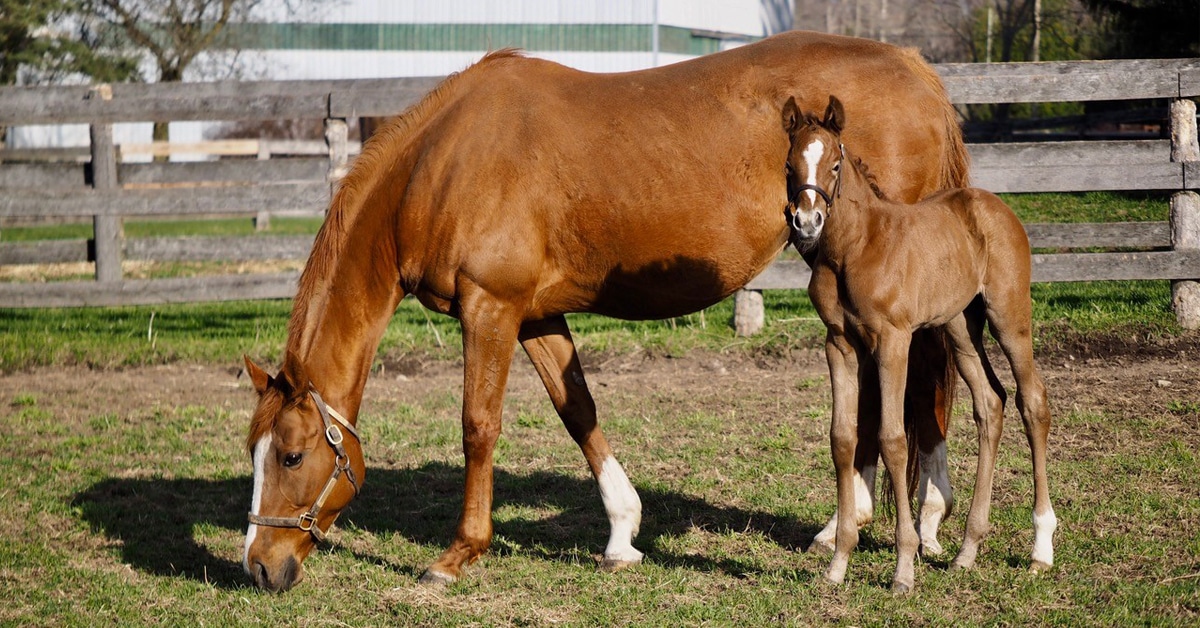“Once you get the horse bug, you have the horse bug for life.”
So says Theodore ‘Ted’ Burnett, owner, breeder, and lover of the racing game, who adds. “I’m not so foolish as to think that you can make money in this game by strictly racing. We really are a breeding operation. We love to breed. We do race what we don’t sell, if it doesn’t make reserve or if I want to keep a mare for the family.”
You will probably already recognize his name in the racing form as an owner. As a breeder, his operation exists as Josham Farms Limited. His breeding operation is run out of Persley Den Farms by another lifelong horse person, Yvonne Schwabe.
“He’s had his horses with me for maybe thirty years,” says Schwabe, whose private operation started as a family farm belonging to her parents. In 2007, Schwabe became the sole proprietor of Persley, which is located just south of Acton.
Where racing dreams begin
Everyone has a different story about how they fell into the racing and breeding industry. For Burnett, the seed was planted early.
“I was eight years old, and I was at home with the mumps. My mother put me in front of the TV and there was a cheesy old movie on called My Old Kentucky Home. It was a story about a handicapped boy who was the farm manager’s son, and then there was a sick foal. The farm manager said, ‘If you want to take care of this foal, I will give him to you.’ It was one of those stories where the foal gets better and wins the Kentucky Derby. And they had these rolling hills and white fences, I thought, ‘I’m going to do this when I get older, I love this,” says Burnett.
Fast forward to the mid-’70s. Fresh out of law school, Burnett got his first introduction to the game when he and his brother bred a couple of mares to Nightly Dawn at Hill ‘n Dale, formerly run by the late John Sikura Sr.
“We got there at seven at night, and we left there at seven in the morning, with two breedings, two more broodmares and a little weanling that had four legs going in four different directions. We named him Plus De Rien. This was our introduction to horse racing,” says Burnett, who is the president of the Burnac Corporation, a family business that began with food distribution and evolved to include interests in real estate and high-end luxury goods.
And Plus De Rien? He ran fifth in the 1977 Queen’s Plate, which was captured by a horse named Sound Reason that year.
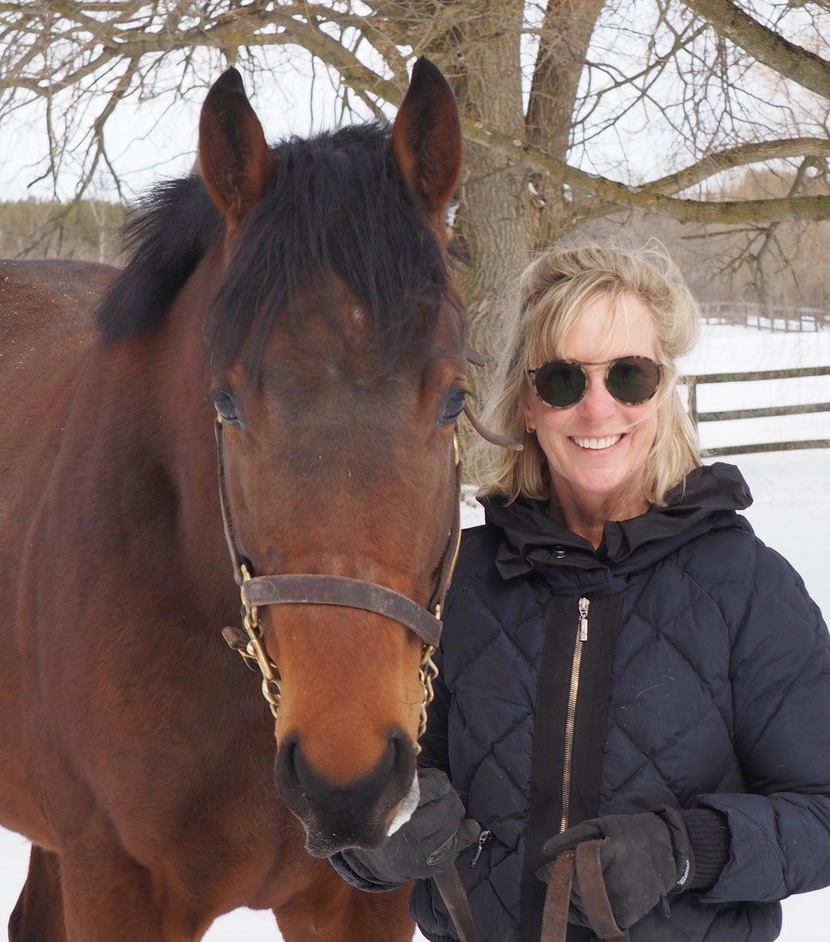
Yvonne Schwabe. (Thoroughbred Aftercare Alliance Facebook photo)
Meanwhile, Schwabe’s road to the racing world was slightly different to Ted’s journey.
“My parents immigrated from Germany. It was one of those stories where they came with $200 after the war. They wanted a fresh start. My grandfather was a trainer, and my grandmother believe or not, on my mother’s side was a female jockey when women weren’t riding,” says Schwabe.
While Ted was dreaming about a Derby win, Schwabe had her eyes set on winning a prestigious race here in Canada. “I grew up as a little girl wanting to breed the winner of the Queen’s Plate. It’s everybody’s dream in the business, but certainly mine started as a little girl.”
Little did she know that dream would come to fruition when Midnight Aria, a horse Schwabe bred, secured the 2013 Plate with jockey Jesse Campbell aboard. Owned by Tucci Stables and trained by Nick Gonzalez, the son of Midnight Lute was out of Schwabe’s mare Shebandowana.
While years have passed, you can still hear the excitement from that moment in Schwabe’s voice. “Quite frankly, I’m still so thrilled and excited that it happened because it doesn’t happen to everybody.”
The broodmare base
Midnight Aria’s dam Shebandowana is one of Schwabe’s foundation mares. Her others include Kick’em Jenny and Classic Neel, which Schwabe co-owns with Burnett.
Ted also has a set of mares that would be considered founding broodmares to his past and present racing stock. “South Sea Blues, who produced Mekong Delta. We have Embur Sunshine, a mare he raced and the dam of Embur’s Song, who was champion. We still have Embur’s Song’s sister, Embur’s Melody,” lists Schwabe.
Embur’s Song won several stakes including three Grade 3 races back in 2011‒ one at Keeneland, and two at Woodbine. She also received the Sovereign Award that year for champion older mare.
Foundation mares aside, Schwabe notes there is a good set of horse moms calling Persley home these days. “Between the two of us, we have 16 broodmares right now.”
Several of Burnett and Schwabe’s runners have gone onto the breeding shed to produce former and current runners at Woodbine.
“We have Sugar Jones; he has Mekong Delta, he has Excelling. He has pretty much everything he raced. Tulsa. I have Midnight Embrace, who is a full sister to Midnight Aria. I have Kick’em Jenny, who was the dam of my good stakes filly Surtsey. Sadly, I lost her foaling a couple of years ago. [Kick’em Jenny] is the dam of the filly that I’m running right now, Bequia, with Kevin Attard.”
Going to school in Carriacou, Grenada, Schwabe has always had a passion for the West Indies and the Grenadines. Kick’em Jenny is named after an underwater volcano just north of Grenada, while Bequia is named after one of the islands in the Grenadines. Surtsey is also named after a volcano in the Atlantic Ocean.
Between 2012 to 2015, Surtsey secured multiple stakes wins at Woodbine including the Fanfreluche (’12), the Ontario Damsel Stakes (’13), the Avowal Stakes (’14), as well as the Zadracarta Stakes (’15). Bequia, a four-year-old daughter of Kick’em Jenny, finished fourth in the Wonder Where stakes last October and broke her maiden a month later.
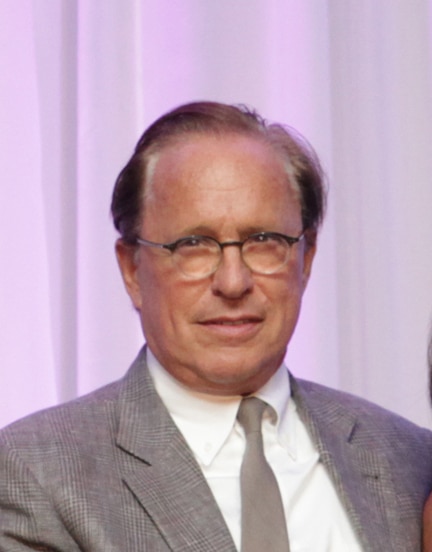
Ted Burnett. (CHRHOF photo)
The hope is always to produce a winner and season after season Schwabe continues to oversee the breeding operation. Burnett and Schwabe’s broodmares are bred in the US and then shipped back across the border. “Most of the mares haven’t come back from Kentucky [yet]. Depending on the mare, we like to wait until they are 30 to 60 days pregnant; we are just waiting for that safe window before they return.”
With a keen eye to staying competitive in the breeding market, Schwabe notes the various stallions of their current foals and future stock to come.
“This year we had foals [of ‘22] by Maclean’s Music, Twirling Candy, Caravaggio, Mitole, Army Mule, Frosted, Improbable. This year we are breeding to Yaupon, Ghostzapper, Good Magic, Bolt D’ Oro, Army Mule, Mitole, Charlatan and Mendelssohn.”
Burnett and Schwabe have bred many successful racehorses, but two in particular stand out. “Two really nice horses, Conquest Tsunami and Conquest Typhoon. Conquest Typhoon was crowned champion two-year-old in Canada. Conquest Tsunami I bred together with Ted. Conquest Typhoon he bred on his own.”
Conquest Tsunami, an Ontario-bred son of Stormy Atlantic out of their foundation mare Classic Neel, broke his maiden first time out at Keeneland in the summer of 2014, then won and placed in various stakes over the next few seasons. In 2018 he clinched the Gr. 3 Daytona Stakes at Santa Anita and finished a respective third in the Al Quoz Sprint at Meydan Racecourse in Dubai.
The year 2014 was also a break-out year for Conquest Typhoon, who captured the Gr. 2 Summer Stakes at Woodbine and the Gr. 3 Cecile B. DeMille Stakes at Del Mar. Another Ontario-bred son of Stormy Atlantic (out of Swanky Bubbles), Conquest Typhoon secured the Sovereign Award for 2014 Champion two-year-old colt.
Breeding goals
While some operations focus on breeding to Ontario sires, that is not the primary goal of Burnett and Schwabe’s operation.
“Our goal was always to breed and to have top-notch Ontario-foaled horses. We have not bred a lot locally, just because we gear our horses to selling in the U.S. When you breed locally, those horses are just not as commercial. For a long time the Ontario Sired Program was a pretty fun program because you could get your money back pretty quickly. We enjoyed that program with a couple of fillies we bought from the sale. But that’s not really our focus. Our focus is to breed the best we can breed.”
Ted offers up a similar sentiment. “We breed seriously. We breed to high-end stallions in the $25,000 to 75,000 range, we sell almost everything in Kentucky. Hopefully we are profitable in most years. I just love it. It’s in my blood. Unfortunately, I would like to sell some of what we raise here in Canada but the market just isn’t here for it.”
In 2021 at the Keeneland September Yearling Sale, over 2,600 yearlings sold. The average price was upwards of $130,000. While Keeneland is a different kettle of fish to Ontario’s CTHS sale, the numbers speak for themselves. Last year, at the CTHS September sale, only 159 yearlings sold for an average price just north of $20,000. But on a promising note, Ontario has moved in a positive direction with increases in both the number of Ontario-sired foals, more stallions in the province, as well as an increase in the number of mares reported bred through October.
Asked to reflect on the current state of Ontario’s breeding industry, Schwabe doesn’t mince words. “I always think there’s more to be done and I think we need more new people in the business. It’s not easy to get people in the business, especially now when the costs have gone completely through the roof and with the pandemic and everything, it’s just made everything is worse. So it’s really hard to make it attractive to people when they are just trying to pay their mortgage.”
The past couple of years have seen supply shortages combined with increased goods and services prices. Not surprisingly, this has an effect on the racing industry as well.
“Labour has gone up in a big way, whether on the racetrack or the farm. It’s not that it’s unrealistic because people have to live and put food on their table. I’m very fortunate; I have some great people but I hear it all over the place that people are struggling trying to find help.”
Horsepeople are also having to dig deeper into their pockets to provide for themselves and their livestock.
“The price of hay has sky rocketed, straw, and fuel for your farm equipment. Across the board costs have gone up significantly, so it’s hard to entice people into the game, which is a volatile game to begin with,” says Schwabe.
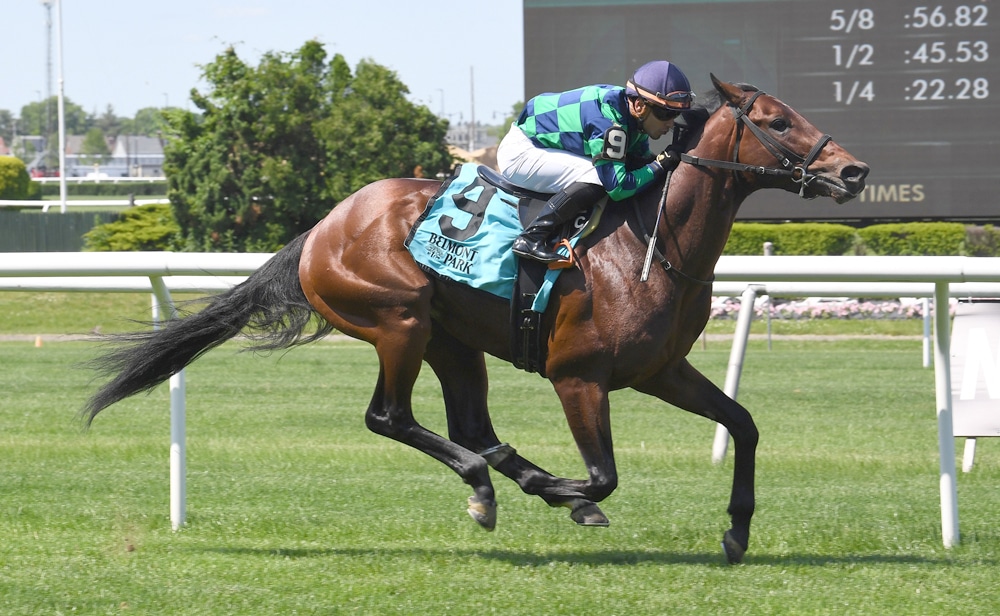
Is Boston Tea Party (American Pharoah – Pirate’s Trove) shown winning at Belmont Park, headed for the Queen’s Plate? (Coglianese Photo)
A possible Plate contender?
On May 29 at Belmont Park, Boston Tea Party, a three-year-old colt out of Josham Farm’s mare Pirate’s Trove, broke his maiden going six furlongs on the turf. The son of American Pharoah is trained by Anthony Dutrow and owned by Paul Braverman, Gold Square LLC, Timothy Pinch, and Chevaux Racing.
According to Burnett, there’s no word yet on where we’ll see Boston Tea Party run next, but they are both excited about his prospects.
“I know that they have kept him eligible for the Plate. Obviously, this was sprinting on the turf first time out…and they ran in a great time, so we were thrilled. Out of that mare we have a Flatter filly going to the sale this year. She had a Caravaggio, and she is also booked back to Mendelssohn,” says Schwabe.
As we head into the summer, Schwabe continues to be busy on the farm with broodmares, foals, and yearlings to be sold later in the year.
“We had 12 foals this year, and we had 12 foals last year. We always try to better the operation by selling a weaker link and buying a better mare. We will have 12 yearlings going to the sale this year and 12 that will go next year.”
The current yearlings on the farm are either owned by Josham Farms, Schwabe, or some they own together. Those future racehorses will be getting prepped and ready for the September sale at Keeneland in Lexington, Kentucky.
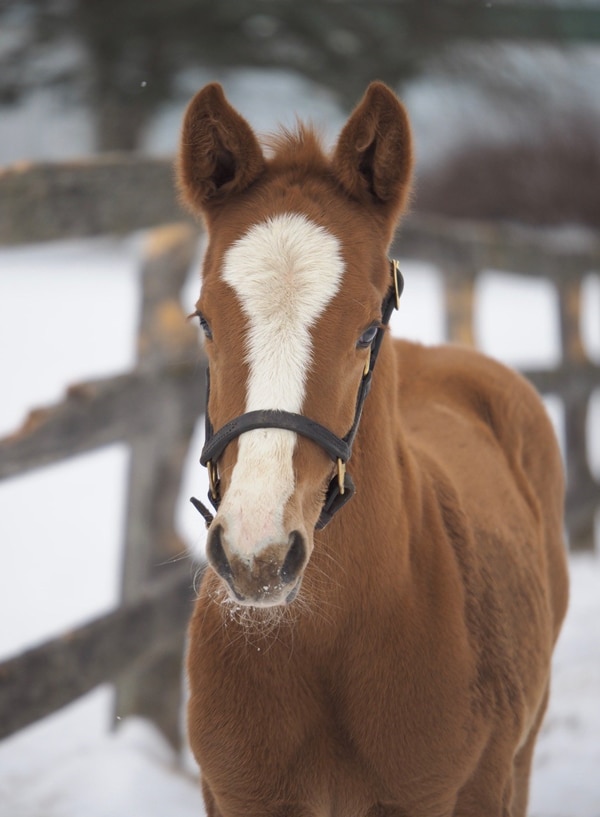
Ted Burnett’s broodmare Tulsa’s Mitole filly. (Photo courtesy Yvonne Schwabe)
“They are all entered right now for Keeneland, except for one who needs a little bit more time and is going to Fasig-Tipton in October. That can change. If we find that another one needs a little more time then we will back them up until Fasig-Tipton. Sometimes a horse just needs a little bit longer and we always keep that door open.”
While the sales are still several months away, racing continues to kick on in the province. At Woodbine, Schwabe has Bequia, while Burnett has several runners based at the Rexdale oval. “Ted has three. Out of Mekong Delta, he has Sugar Ray. He is training well. He has Gancho, a three-year-old who is a $25,000-$40,000 claimer, a very honest horse, and an unraced two-year-old called Overtime.” At the beginning of June, Burnett, also won with Sassy Martini, who Liz Elder trains. On June 9, Gancho won the first race on Woodbine’s Thursday card and was claimed by Alexander Patykewich.
A short list of racehorses, but as Burnett pointed out from the beginning, their plan is not strictly racing; it’s a breeding operation. So, next time you look at the racing form, don’t just look for the owner. Instead, dig a little deeper, and take a moment to see the names of those breeders, such as Burnett and Schwabe, who give life to racing before their equine athletes even step foot onto a racetrack.
“I love horse sales. I love horse racing. It’s my total passion. There’s nothing that gives me greater joy than, for example, seeing Boston Tea Party, who was born and raised here, win a race at Belmont against a stellar field of maidens. There’s just such a thrill. It just sends your heart flying. When you sell a horse well at a sale, and it goes to a great home, you just feel this huge sense of pride.”

